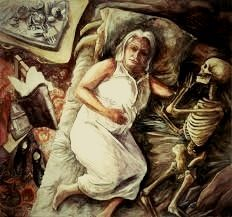African American Theory in "Everyday Use"
African American Tradition in Alice Walker's "Everyday Use"
Throughout Alice Walker's short story "Everyday Use," tradition is a central theme. African American traditions include folk crafts such as quilting and sewing as well as more traditional African American names. Alice Walker uses Mama, Dee, and Maggie to bring the tradition of quilting and sewing and traditional African American names to light.
Dee starts off as a character that only cares about the materialistic things of life and not so much about the traditions set forth by her culture, and she couldn’t care any less about her heritage. Near the end of the story, Dee takes a turn and chooses to change her name to Wangero Leewanika Kemanjo:
““Well,” I say. “Dee.” “No, Mama,” she says. “Not ‘Dee,’ Wangero Leewanika Kemanjo!” “What happened to ‘Dee’?” I wanted to know. “She’s dead,” Wangero said. “I couldn’t bear it any longer, being named after the people who oppress me.” “You know as well as me you was named after your aunt Dicie,” I said. Dicie is my sister. She named Dee. We called her “Big Dee” after Dee was born. “But who was she named after?” asked Wangero. “I guess after Grandma Dee,” I said. “And who was she named after?” asked Wangero. “Her mother,” I said, and saw Wangero was getting tired. “That’s about as far back as I can trace it,” I said. Though, in fact, I probably could have carried it back beyond the Civil War through the branches. “Well,” said Asalamalakim, “there you are” (Walker 350).
Dee doesn’t see the importance of the name she was given even though the name “Dee” is more important to Mama, as it was passed down through generations in her family. Dee does not realize that her name does connect her to her past and to her culture, as her ancestors knew how to quilt and sew, and I am sure many other traditional African American activities.
Traditional African American names are extremely important to their culture, so much so that Alice Walker caught some criticism for changing Dee’s name to Wangero, as it is NOT a traditional name in the culture:
“The footnote on the page says "Wangari is a Kikuyu clan name indicating honorary acceptance into the Leopard clan." In "Everyday Use" Alice Walker lets the educated sister Dee introduce herself as "Wangero Leewanika Kemanjo.” The uninformed reader may think this is an ordinary African name. I assure you it is not. Even a recent casebook on "Everyday Use" edited by Barbara T. Christian in 1994, only added to the confusion of the African names since it mistakenly noted that the name given to Walker by Africans during her trip there was Wangero,(sic!) A name she uses for herself in Once and for the educated sister in "Everyday Use.''9 In the next paragraph it says: Names are extremely important in African and African American culture as a means of indicating a person's spirit” (Hoel 4).
This offended a huge group of people, specifically people of the Kikuyu culture, as some of the names were even misspelled in Walker’s work and Kikuyu names were used when incorrect, or the meaning of the name is incorrect in the work. I can surely understand the frustration and the disappointment in this group of people, as Alice Walker is an advocate and positive voice in the African American community, and this work was written in the 1970s when there was heavy discrimination with African Americans and their traditions.
On a more positive note, Walker uses the tradition of quilting and sewing positively in her work. In the scene, we see the quilts in which Mama had stored away: “Out came Wangero with two quilts. They had been pieced by Grandma Dee and then Big Dee and me had hung them on the quilt frames on the front porch and quilted them. One was in the Lone Star pattern. The other was Walk Around the Mountain. In both of them were scraps of dresses Grandma Dee had worn fifty and more years ago. Bits and pieces of Grandpa Jarrell’s Paisley shirts. And one teeny faded blue piece, about the size of a penny matchbox, that was from Great Grandpa Ezra’s uniform that he wore in the Civil War” (Walker 352).
The Lone Star pattern (shown above) historically symbolizes “The Lakota embraced the Star quilt—other communities call it the Morning Star, Star of Bethlehem, or Lone Star—because it brings together a new art form and a traditional design” (Greendeer). According to Kevin Locke, the morning star “represents fulfillment of the release from darkness, ushering in a new day. It’s really a wonderful symbol” (Locke). Since Grandma Dee had this hanging, she had to believe the traditional African American belief behind the quilt.
In Alice Walker’s “Everyday Use,” tradition is a central theme. As I said, in some cases, Alice Walker’s interpretation was incorrect, upsetting some people, and in other cases it is executed beautifully and through art. Walker uses Mama, Dee, and Maggie to bring the tradition of quilting and sewing and traditional African American names to light.
Works Cited
Cash, Floris Barnett. “Kinship and Quilting: An Examination of an African-American
Tradition.” The Journal of Negro History, vol. 80, no. 1, 1995, pp. 30–41. JSTOR, https://doi.org/10.2307/2717705. Accessed 21 Mar. 2024.
Greendeer, Kendra. “Emblems of Identity.” National Museum of African American History and
Hoel, H. “Personal Names and Heritage: Alice Walker’s ‘Everyday Use’”. American Studies in
Scandinavia, vol. 31, no. 1, Mar. 1999, pp. 34-42, doi:10.22439/asca.v31i1.1479.
Larrimore, Walter. Sundance Star. 1968-1980. Standing Rock Reservation, North and South
Dakota. National Museum of African American History and Culture, https://nmaahc.si.edu/explore/stories/evolution-expression#:~:text=The%20Star%20quilt%E 2%80%94given%20to,Lake%20Indian%20Reservation%2C%20North%20Dakota.
Walker, Alice. “Everyday Use.” Using Critical Theory, edited by Lois Tyson. Routledge, 2021,
pp. 347-354.
Weinberg College of Arts and Sciences. “Through the folk art of quilting, Tracy Vaughn-Manly
works to preserve Black American history and Culture.” Northwestern Weinberg College of Arts and Science, https://news.weinberg.northwestern.edu/2023/02/14/tracy-va ughn-manly-works-to-preserve-quilting-history-at-northwestern/#:~:text=Born%20out%20of%20necessity%2C%20ensl aved,writing%20were%20illegal%20for%20them.



Comments
Post a Comment